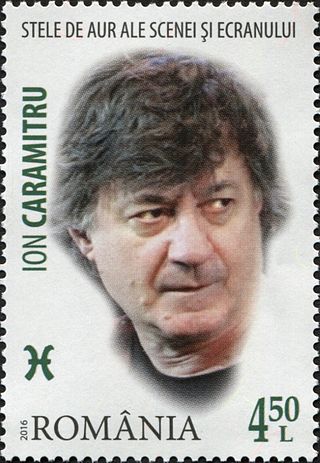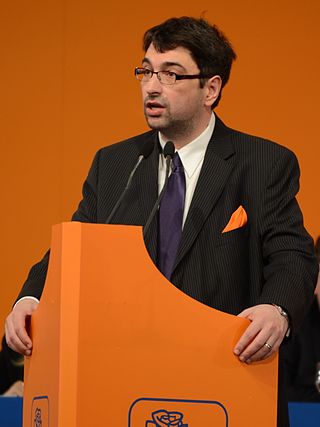Mircea Dinescu is a Romanian poet, journalist, and editor.
Romanian literature is the entirety of literature written by Romanian authors, although the term may also be used to refer to all literature written in the Romanian language or by any authors native to Romania.

Șerban Vodă Cemetery is the largest and most famous cemetery in Bucharest, Romania.

Victor Rebengiuc is a Romanian film and stage actor, also known as a civil society activist.

Dacianism is a Romanian term describing the tendency to ascribe, largely relying on questionable data and subjective interpretation, an idealized past to the country as a whole. While particularly prevalent during the regime of Nicolae Ceaușescu, its origin in Romanian scholarship dates back more than a century.
Vladimir Tismăneanu is a Romanian American political scientist, political analyst, sociologist, and professor at the University of Maryland, College Park. A specialist in political systems and comparative politics, he is director of the University of Maryland's Center for the Study of Post-Communist Societies, having served as chairman of the editorial committee (2004–2008) and editor (1998–2004) of the East European Politics and Societies academic review. Over the years, Tismăneanu has been a contributor to several periodicals, including Studia Politica, Journal of Democracy, Sfera Politicii, Revista 22, Evenimentul Zilei, Idei în Dialog and Cotidianul. He has also worked with the international radio stations Radio Free Europe and Deutsche Welle, and authored programs for the Romanian Television Company. As of 2009, he is Academic Council Chairman of the Institute for People's Studies, a think tank of the Romanian Democratic Liberal Party. Between February 2010 and May 2012, he was also President of the Scientific Council of the Institute for the Investigation of Communist Crimes in Romania.

Gabriela Adameșteanu is a Romanian novelist, short story writer, essayist, journalist, and translator. The author of the celebrated novels The Equal Way of Every Day (1975) and Wasted Morning (1983), she is also known as an activist in support of civil society and member of the Group for Social Dialogue (GDS), as well as editor of Revista 22.

Ion Horia Leonida Caramitru, OBE was a Romanian stage and film actor, stage director, and political figure. He was Minister of Culture between 1996 and 2000, in the Romanian Democratic Convention (CDR) cabinets of Victor Ciorbea, Gavril Dejeu, Radu Vasile, Alexandru Athanasiu, and Mugur Isărescu. He was married to actress Micaela Caracaș and had three sons: Ștefan, Andrei, and Matei Caramitru. He was a relevant figure of the Aromanian community of Romania.
The Presidential Commission for the Study of the Communist Dictatorship in Romania, also known as the Tismăneanu Commission, was a commission started in Romania by Romanian President Traian Băsescu to investigate the regime of Communist Romania and to provide a comprehensive report allowing for the condemnation of communism as experienced by Romania.
The Ciorbea Cabinet was the 112th cabinet of Romania, formed 12 December 1996 and dissolved 30 March 1998, with Victor Ciorbea as head of government. It was a coalition cabinet formed between the winner of the elections, CDR, USD, and UDMR.

Sever Voinescu is a Romanian journalist, political analyst, diplomat and right-wing politician. A Foreign Affairs Ministry figure during the mid-1990s, he was later a Consul General of Romania in Chicago, United States. Voinescu became known as a columnist for Dilema Veche weekly and Cotidianul daily, and worked for the Institute for Public Policies, a political think tank. As pundit, Voinescu supports conservative ideas, and criticizes left-wing and welfare state solutions as applied to his country.

Aiud Prison is a prison complex in Aiud, Alba County, located in central Transylvania, Romania. It is infamous for the treatment of its political inmates, especially during World War II under the rule of Ion Antonescu, and later under the Communist regime.
This is a list of 1990 events that occurred in Romania.
This is a list of 1999 events that occurred in Romania.

Mihai Viteazul National College is a high school located at 62 Pache Protopopescu Boulevard, Bucharest, Romania. One of the most prestigious secondary education institutions in Romania, it was named after the Romanian ruler Michael the Brave.

Jilava Prison is a prison located in Jilava, a village south of Bucharest, Romania.








